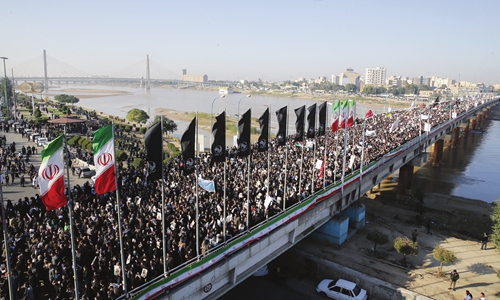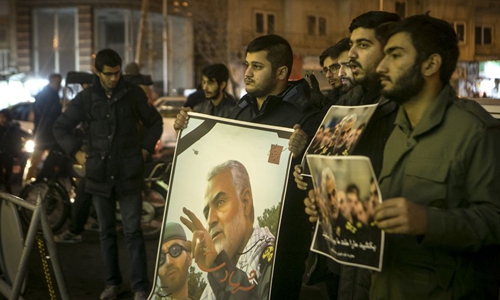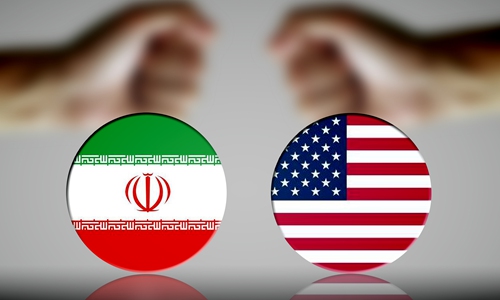China urges easing of Iran-US tensions
Full-fledged Iran-US war against all interests: analysts

Iranians pay homage to major general Qasem Soleimani on the streets of the city of Ahvaz after his death from an air-strike in Baghdad ordered by US President Donald Trump. Soleimani’s killing ratcheted up tensions between the US and Iran and sparked fears of a new war in the Middle East. Photo: AFP
As the US killing of a top Iranian military officer risks seriously aggravating the Middle East, Chinese officials urged all sides to remain calm and opposed to the use of force in international relations, as a wider war was unaffordable for the world and no country including China would be immune from it.
After the US killed Iranian major general Qasem Soleimani, head of the Quds Force of the Islamic Revolutionary Guard Corps, and Abu Mahdi al-Muhandis, a commander of Iraq's Shia Hashd al-Shaabi, or Popular Mobilization Units, in an air-strike on Friday, tension quickly escalated as tens of thousands of mourners and pro-Iranian fighters flooded the Baghdad streets chanting "Revenge is coming!"
Chinese officials have communicated actively with all parties on the escalating conflict between Tehran and Washington during the weekend, a reflection of China's firm position of safeguarding regional peace and calling for conflict resolution through diplomatic means, according to Chinese analysts.
Yang Jiechi, a member of the Political Bureau of the Communist Party of China (CPC) Central Committee, told US Secretary of State Mike Pompeo in a phone call on Friday night that China was very concerned about the Middle East.
The Chinese government always supports resolving differences through dialogue and opposes the use of force in foreign relations, Yang said.
Yang called for all relevant parties, especially the US, to remain restrained and de-escalate the situation.
On Saturday, Chinese State Councilor and Foreign Minister Wang Yi spoke with foreign ministers of Iran, Russia and France.
In a phone call with Iranian Foreign Minister Mohammad Javad Zarif, Wang said the risky US military action, contrary to the basic norms of international relations, would exacerbate tensions and instability in the region, according to a statement published on the website of the Chinese Ministry of Foreign Affairs.
The use of military means in relations would lead to nowhere, the statement said, and the Chinese side urged the US not to abuse military power and to resolve issues through dialogue.
China and Russia also opposed the abuse of military force in the US-Iran conflict and agreed to strengthen joint strategic coordination to maintain international justice, according to a phone call between Wang and Russian Foreign Minister Sergey Lavrov.
China and France agreed on the importance of the Iran nuclear deal and communications, calling for prevention of an escalation in tensions, according to the Chinese Foreign Ministry's website.
What Yang and Wang said indicated that China conformed to its consistent attitude to mediate between different sides seeking negotiation and agreement on global issues, according to Chinese experts.
"It showed that China is urging all sides to calm down and seek a resolution through negotiation," said Niu Xinchun, a research fellow at the China Institute of Contemporary International Relations in Beijing.
The Chinese Embassy in the US on Sunday issued a safety alert amid enhanced security measures in the US following the death of Soleimani while protesters in cities like Washington DC and New York protested against the prospects of war with Iran.

People hold posters of Qasem Soleimani, a top Iranian commander, during a mourning ceremony in Tehran, Iran, Jan. 3, 2020. Photo: Xinhua
Safeguard peaceNot only "World War III" becomes trendy topic on Twitter, Chinese internet users also pay growing attention to the regional turbulence on Sina Weibo in the context of the US-China trade war that has been weighing down the rise of the world's second-largest economy over the past year.
In response to online arguments that a looming war between the US and Iran offered China a strategic opportunity, Niu deemed that thinking impractical. The US dispatched 530,000 troops in the Gulf War in 1990 and 160,000 in the Iraq War in 2003, Niu said.
Only a war in abovementioned scale could refocus US attention on the Middle East, and neither the US or Iran would seem to like such a war, he argued.
"We can see that the two sides have both been avoiding facing such a situation since the Middle East regional situation escalated in May 2019 when the US imposed new sanctions on Iran oil," Niu said.
Chinese analysts warned that the world was no longer how it was in the time of the Cold War and the idea that the more chaotic the enemy, the better for China, did not fit the modern world.
As one of the five permanent members of the UN Security Council, China has a responsibility for international peace and security, the Chinese foreign minister said.
The general principle of the Chinese government on this issue was to "get the conflict under control," said Jin Canrong, associate dean of Renmin University of China's School of International Studies in Beijing.
The US attack was against international law and should be condemned, he noted.
"If the world enters chaos and if everybody follows the moves of Washington, no one will survive," Jin said.

Iran US Photo:IC
Regional interests
China must also weigh its own interests in the region, according to analysts.
Iran, located along the routes of the China-proposed Belt and Road Initiative, is expected to play a more significant role in enhancing connectivity and trading between Asia and Europe.
Globalization has connected the world, not to mention China has overseas interests, Niu noted.
"China's oil imports from the Middle East and its construction projects in the region will all be seriously affected if the region becomes chaotic," he said.
China is Iran's largest trade partner. The two sides' trade reached $35 billion in 2018, according to the Chinese Embassy in Iran. China's oil imports from Iran were 29.27 million tons in 2018, or $15 billion, increasing 21.8 percent compared to 2017. China-Iran economic ties were also seriously affected after November 2018 when the US government re-imposed full sanctions on Iran, a decision which the White House outlined as part of an unprecedented US economic pressure campaign.
When unrest happened in the Middle East in the past, withdrawal was the only option for China, Niu said.
Take Syria as an example. China suffered losses of about 18 billion yuan ($2.6 billion), he said.
A chaotic Iran would not only affect the Middle East, but also North Africa, Central Asia and South Asia, warned Wu Bingbing, head of the institute of Arabic-Islamic culture studies at Peking University in Beijing.
"A serious arms race will occur once chaos occurs. Nobody will feel safe or trust each other. How could China carry out cross-regional cooperation at that time?" Wu said.
Newspaper headline: China urges easing of tensions